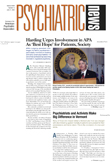APA has had 129 presidents since its founding in 1844. APA was begun as the Association of Medical Superintendents of American Institutions for the Insane. It was renamed the American Medico-Psychological Association in 1892 and the American Psychiatric Association in 1922.
Between 1844 and 1883, nine superintendents served presidential terms of three to eight years. Meetings have been held annually except for 1845, 1847, 1861, and 1945. At the annual meeting in 1882, Dr. John Chapin of Willard, N.Y., proposed a resolution that presidents serve a one-year term and that each make an annual address. The resolution was adopted and has been carried out since.
At APA’s 100th anniversary in 1944, the American Journal of Psychiatry (from 1844 to 1921, the American Journal of Insanity) published a centennial issue that traced psychiatry’s history and looked to its future. The article “The View From the Chair” by Fry and Rostow of Yale University commented on the presidential addresses. Dr. John Callender of Nashville, Tenn., gave the first presidential address in 1883, and it was titled “The History and Work of the Association.” He discussed the 13 founders and Dorothea Dix, as well as efforts to improve the care of patients and decried political influence on the management of hospitals.
With some exceptions, many of the following presidential addresses reflected on the history of the Association and its progress and problems. The second address, by Dr. John Gray of Utica, N.Y., the editor of the American Journal of Insanity for 32 years, was titled “Heredity,” in which he voiced his belief that undue importance is attached to heredity in connection with the causation of insanity.
In 1885 Pliny Earle reported a statistical study titled “The Curability of Insanity” in which he stated that claims of a cure in many cases were not substantiated.
The longest address is credited to Dr. John Curwen, who was secretary of the Association for 34 years (1858-92) and president in 1893-94. In a 64-page report he presented brief sketches of the lives of the founding fathers based on his personal acquaintance with them and of 35 other prominent psychiatrists of his time. He included a long tribute to Dorothea Dix.
Since APA’s founding, most of its presidents were mental hospital superintendents, and their addresses reflected their experiences in these institutions. Dr. Thomas Salmon, president of APA in 1923-24, changed the pattern. He had been the medical director of the National Committee for Mental Hygiene and later senior psychiatrist for the Army overseas in World War I. In his speech he said, “I should like to bring before you certain relationships that exist between. . .psychiatry and the medical profession as a whole and between psychiatry and general medical science.”
Some topics chosen by other presidents included Clark (1892), on “The Dualism of Body and Mind”; Blumer (1903), “Eugenics and Immigration”; Burr (1906), “The Physician as a Character in Fiction”; White (1925), “On Psychoanalysis”; Orton (1929), “The Need for Research”; Kirby (1934), “The Value of Psychotherapy.”
Dr. Adolf Meyer, the dean of American psychiatry, was president in 1928. He spoke about 35 years of psychiatry in the United States and the outlook for the field. He urged the Association to move toward granting special diplomas for further study in psychiatry. The Association responded, and the American Board of Psychiatry and Neurology was established in 1934.
In 1969 publication of the presidential speeches was brought up to date, from 1944 to 1968. Dr. George Mora, chair of APA’s Committee on History, wrote in an introduction, “These addresses contribute a living history of our Association and present guidelines for the future.” ▪
